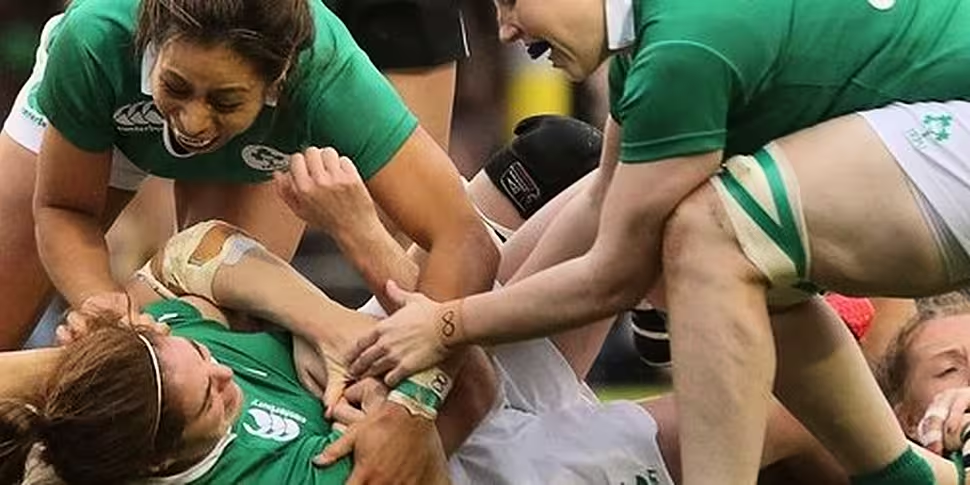The Irish women's rugby team played a first ever November series in 2016, and while results were poor, there is plenty to build on in a big 2017 for the team.
Ireland will host the Women's Rugby World Cup next year, but before they begin to contemplate that, they have the small matter of the Six Nations.
Ireland embarked on an ambitious Autumn series, playing the top three teams in the world: England, Canada and New Zealand.
World Champions England were first to visit, and despite the home side dominating possession, they were narrowly beaten 12-10 in UCD by their guests. England showed their class as they scored a try late on to snatch the win, but there were undoubtedly positives that the players took from that opening match.

Ireland's Sene Naoupu and Chloe Pearse celebrates with try scorer Nora StapletonImage: ©INPHO/Billy Stickland
Looking back at the series, former Ireland captain Fiona Coghlan told Newstalk.com that the matches were about more than the results for the game as a whole here in Ireland.
"It was great to have a November Series for the first time ever. To be able to host top class teams is a fantastic development in the women's game in Ireland.
"The Irish team now have a clear picture of what stage they are at, and where they need to go to next. The Six Nations now needs to be used to cement different combinations and game plans going forward.
"Overall the results and areas of performance were disappointing and there is a lot of work to be done in the next eight and half months. Whilst every pool in the World Cup is tough, we are very lucky to be avoiding the teams we just played in November.
"The fixture against England was positive from a defensive performance. Ireland had a large percentage of possession in that game but failed to do too much with it," she added.
Ireland welcomed a much-fancied Canadian team to Belfield a week later. Canada were runners-up in the 2014 World Cup and Irish coach Tom Tierney made 10 changes to the home side in a bid to expand his player pool.

Canada’s Carolyn McEwen with Fiona Reidy and Nichola Fryday of Ireland. Image: ©INPHO/Tommy Dickson
The experiment backfired, as Ireland were ruthlessly exposed by the visitors who ran in seven tries to leave the final score at 48-7. Nikki Caughey crossed the whitewash to register Ireland's only score in the second half.
"The selection for the Canada game was unusual, to put out a second string Irish team against the second best team in the world," Coghlan said.
"While I understand Tierney wanted to give as many players as possible some exposure in the November Series, there were too many inexperienced players on the pitch at the same time to benefit anyone's development. It did, however, allow Tierney to see what players would stand up when under severe pressure," she added.

Ireland's Nikki Caughey on the attack. Image: ©INPHO/Donall Farmer
The Irish coach once again rang the changes as New Zealand came to Belfield for the final test of the series, with Niamh Briggs among the additions to the side.
Ireland matched the visitors for most of the first half, and only trailed 5-3 at the break - a Nora Stapleton penalty was Ireland's response to a Selica Winiata try.
However, the Black Ferns upped the tempo after half-time and eventually ran out 38-8 to cement their position as the top team in the women's game at the moment, after winning five from five on their end of year tour.
Niamh Kavanagh scored late on for the home side.

Ireland's Sene Naoupu celebrates Niamh Kavanagh's late try. Image: ©INPHO/Morgan Treacy
"New Zealand came on this tour with a clear intent that they wanted to re-establish their reputation as being the number one team in the world, and they did just that," said Coghlan, reflecting on the final game of Ireland's series.
"While some people would have been happy with the half-time score, I wasn't at the time, as this appears to be the way that New Zealand have gone in most of their games. They appear to play conservatively in the first half and really let loose in the second half; they move the ball more and this was when they were most devastating."
A key area of concern for the former Ireland captain was the points differential that the team were left with at the end of their three games: Tierney's side conceded 98 points and only scored three tries in reply.
"Obviously it was disappointing only to score three tries. The breakdown was one of our biggest problems, and not getting quick enough ball to allow Ireland get on the front foot. Whilst there were some fantastic individual performances, the team need to develop an instinctive cohesiveness."
Ireland will need to rectify some of these areas quickly, as they travel to Scotland for their first Six Nations match on February 3rd.
Download the brand new GoLoud App in the Play Store & App Store right now! We've got you covered!
Subscribe to OffTheBall's YouTube channel for more videos, like us on Facebook or follow us on Twitter for the latest sporting news and content.








